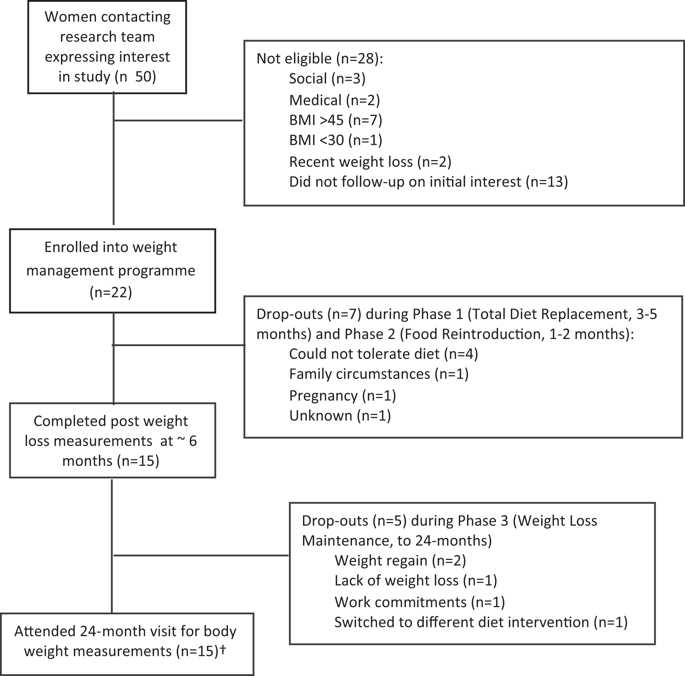当前位置:
X-MOL 学术
›
Eur. J. Clin. Nutr.
›
论文详情
Our official English website, www.x-mol.net, welcomes your
feedback! (Note: you will need to create a separate account there.)
The role of appetite-related hormones, adaptive thermogenesis, perceived hunger and stress in long-term weight-loss maintenance: a mixed-methods study.
European Journal of Clinical Nutrition ( IF 3.6 ) Pub Date : 2020-02-04 , DOI: 10.1038/s41430-020-0568-9 George Thom 1 , Stephan U Dombrowski 2 , Naomi Brosnahan 1 , Yasmin Y Algindan 3 , M Rosario Lopez-Gonzalez 4 , Giles Roditi 4 , Michael E J Lean 1 , Dalia Malkova 1
European Journal of Clinical Nutrition ( IF 3.6 ) Pub Date : 2020-02-04 , DOI: 10.1038/s41430-020-0568-9 George Thom 1 , Stephan U Dombrowski 2 , Naomi Brosnahan 1 , Yasmin Y Algindan 3 , M Rosario Lopez-Gonzalez 4 , Giles Roditi 4 , Michael E J Lean 1 , Dalia Malkova 1
Affiliation

|
BACKGROUND/OBJECTIVES
Weight-loss maintenance is challenging, and few succeed in the long term. This study aimed to explain how appetite-related hormones, adaptive thermogenesis, perceived hunger and stress influence weight-loss maintenance.
SUBJECTS/METHODS
Fifteen adult women (age, 46.3 ± 9.5 years; BMI, 39.4 ± 4.3 kg/m2) participated in a 24-month intervention, which included 3-5 months total diet replacement (825-853 kcal/d). Body weight and composition (Magnetic Resonance Imaging), resting metabolic rate (indirect calorimetry), and fasting plasma concentration of leptin, ghrelin, glucagon-like peptide-1 (GLP-1), peptide YY (PYY), and growth differentiation factor 15 (GDF-15) were measured at baseline and after weight loss, around 6 months. Perceptions relating to weight-loss maintenance were explored using qualitative interviews.
RESULTS
Mean (SD) changes in body weight (-13.8 ± 6.3 kg) and total adipose tissue (-11.5 ± 4.9 kg) were significant (P < 0.001). Weight loss was associated with a significant reduction in resting metabolic rate (-291 ± 226 kcal/day, P < 0.001) and adaptive thermogenesis (-150 ± 162 kcal/day, P = 0.003), reduction in leptin (P < 0.001) and GLP-1 (P = 0.015), an increase in ghrelin (P < 0.001), and no changes in PYY and GDF-15. Weight regain between 6 and 24 months (6.1 ± 6.3 kg, P < 0.05) was correlated positively with change in GLP-1 (r = 0.5, P = 0.037) and negatively with GLP-1 at baseline (r = -0.7, P = 0.003) and after weight loss (r = -0.7, P = 0.005). Participants did not report increased hunger after weight loss, and stress-related/emotional eating was perceived as the main reason for regain.
CONCLUSIONS
Weight regain is more likely with lower fasting GLP-1 and greater reduction in GLP-1 after weight loss, but psychological aspects of eating behaviour appear as important in attenuating weight-loss maintenance.
中文翻译:

食欲相关激素、适应性产热、饥饿感和压力在长期减肥维持中的作用:一项混合方法研究。
背景/目标 维持减肥是具有挑战性的,而且很少能长期成功。这项研究旨在解释与食欲相关的激素、适应性产热、饥饿感和压力如何影响减肥维持。对象/方法 15 名成年女性(年龄,46.3 ± 9.5 岁;BMI,39.4 ± 4.3 kg/m2)参与了为期 24 个月的干预,其中包括 3-5 个月的总饮食替代(825-853 kcal/d)。体重和成分(磁共振成像)、静息代谢率(间接量热法)和空腹血浆中瘦素、生长素释放肽、胰高血糖素样肽-1 (GLP-1)、肽 YY (PYY) 和生长分化因子 15 的浓度(GDF-15) 在基线和体重减轻后约 6 个月进行测量。使用定性访谈探讨了与维持减肥有关的看法。结果 体重 (-13.8 ± 6.3 kg) 和总脂肪组织 (-11.5 ± 4.9 kg) 的平均 (SD) 变化是显着的 (P < 0.001)。体重减轻与静息代谢率显着降低(-291 ± 226 kcal/天,P < 0.001)和适应性产热(-150 ± 162 kcal/天,P = 0.003)、瘦素减少(P < 0.001)相关和 GLP-1 (P = 0.015),生长素释放肽增加 (P < 0.001),而 PYY 和 GDF-15 没有变化。6 至 24 个月之间的体重恢复(6.1 ± 6.3 kg,P < 0.05)与 GLP-1 的变化呈正相关(r = 0.5,P = 0.037),与基线时的 GLP-1 呈负相关(r = -0.7,P = 0.003) 和体重减轻后 (r = -0.7, P = 0.005)。参与者没有报告体重减轻后饥饿感增加,压力相关/情绪化进食被认为是体重减轻的主要原因。
更新日期:2020-02-04
中文翻译:

食欲相关激素、适应性产热、饥饿感和压力在长期减肥维持中的作用:一项混合方法研究。
背景/目标 维持减肥是具有挑战性的,而且很少能长期成功。这项研究旨在解释与食欲相关的激素、适应性产热、饥饿感和压力如何影响减肥维持。对象/方法 15 名成年女性(年龄,46.3 ± 9.5 岁;BMI,39.4 ± 4.3 kg/m2)参与了为期 24 个月的干预,其中包括 3-5 个月的总饮食替代(825-853 kcal/d)。体重和成分(磁共振成像)、静息代谢率(间接量热法)和空腹血浆中瘦素、生长素释放肽、胰高血糖素样肽-1 (GLP-1)、肽 YY (PYY) 和生长分化因子 15 的浓度(GDF-15) 在基线和体重减轻后约 6 个月进行测量。使用定性访谈探讨了与维持减肥有关的看法。结果 体重 (-13.8 ± 6.3 kg) 和总脂肪组织 (-11.5 ± 4.9 kg) 的平均 (SD) 变化是显着的 (P < 0.001)。体重减轻与静息代谢率显着降低(-291 ± 226 kcal/天,P < 0.001)和适应性产热(-150 ± 162 kcal/天,P = 0.003)、瘦素减少(P < 0.001)相关和 GLP-1 (P = 0.015),生长素释放肽增加 (P < 0.001),而 PYY 和 GDF-15 没有变化。6 至 24 个月之间的体重恢复(6.1 ± 6.3 kg,P < 0.05)与 GLP-1 的变化呈正相关(r = 0.5,P = 0.037),与基线时的 GLP-1 呈负相关(r = -0.7,P = 0.003) 和体重减轻后 (r = -0.7, P = 0.005)。参与者没有报告体重减轻后饥饿感增加,压力相关/情绪化进食被认为是体重减轻的主要原因。










































 京公网安备 11010802027423号
京公网安备 11010802027423号